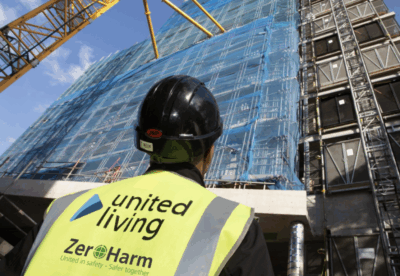The CITB confirmed this week that it had won the vote to continue for another three years.
But some construction companies are concerned by the way they were questioned.
And the Enquirer has been contacted by firms who have raised the issue with the industry standards body the Market Research Society.
The Enquirer has also seen transcripts of interviews with contractors.
One director quizzed said: “I am very much against the CITB continuing but the whole phone survey was baffling.
“I was so concerned I went back to the company carrying-out the research and asked for the transcript.
“It turned out that I was counted as a supporter despite that clearly not being the case.”
Steve Radley, Policy Director at CITB, said: “We are confident that the employer survey, which was our largest ever for Consensus, was conducted appropriately.
“The research company had a very small number of requests from employers for interview transcripts, resulting in four requests to change their support for the levy proposal from yes to no.
“All of these requests were granted. Later this month we will publish the Consensus research in full, including questions asked in the survey and the responses given.”
The transcript of the conversation is replicated below:
Interviewer (I): If you can spare the time, we’re running a research study about the levy and grant system.
Responder (R): Yeah, sure go on.
I: Okay, I’m not asking facts or figures, it’s just your opinions.
R: Yeah go on then.
I: I’ll just let you know that the call may be recorded for quality and training, and I’ve got a bit of a daft question to begin with but, before I called you today, had you heard of the CITB, the Construction Industry Training Board?
R: Yeah cos we pay it don’t we. We pay the levy.
I: Yeah, that’s it. The next question is, when the screen decides to move on, is how good an understanding would you say you have of the roles and objectives of CITB, would you say none at all, a very limited understanding, fairly good or very good?
R: I’d say very limited really.
I: So on the basis of your understanding then, I’ll leave this open to you, but can you please tell me what CITB has been set up to do?
R: The way I see it is that it’s just to bring apprentices through, that’s what I thought we were paying them for, but yeah, that’s about it.
I: That’s one of the top answers, but as far as that, is there anything else…?
R: No.
I: That’s it, okay, you did say limited anyway, and as far as you say limited knowledge, just bear with me through this list.
R: That’s fine yeah.
I: So, levy registered employers are entitled to receive a number of products and services from CITB, are you aware you can access the following for free, firstly there’s funding for training your employees through the grant scheme?
R: Yeah, we knew that.
I: Okay, support from a CITB advisor through training groups, advisory forums, federations, associations or other groups?
R: Not really no.
I: Support for your business through CITB telephone and online services?
R: No.
I: Levy and grant advice through CITB website, webchat or telephone lines?
R: Nah.
I: No? Online explainer videos for help on subjects like “how to apply for a card” and “how to take on an apprentice”?
R: No.
I: CITB research information on current and future skills needs?
R: No.
I: Construction careers information and advice through Go Construct?
R: No.
I: Support in recruiting and managing apprentices through CITB apprenticeships or the managing agency?
R: No.
I: And funding for training projects through the flexible and structured fund schemes?
R: No… I did say limited didn’t I!
I: That’s fair enough, that’s what I’m after, just give me the truth. Now, I’m gonna put you on the spot here…
R: That’s alright.
I: Well, what do you think are the important skills issues that the construction industry will face in the next year or so?
R: Oh, a definite shortage, yeah.
I: Yeah? Shortage of?
R: Oh, it is now, but, these kids these days haven’t got a clue have they? That’s the problem.
I: Right, so poor calibre. As far as your shortage though, I’ve got a couple of boxes to tick and I can’t really give you the answers, so a shortage of?
R: Tradespeople, of every kind.
I: Right, that’s what I’m after. Any other important skills issues that you can see?
R: Not really, that would be the main thing.
I: Okay, alright then. Now, moving on a scale of 1 to 5, 1 is completely unimportant, 5 is very important, how important would you say it is for CITB to inspire talented people to join the construction sector?
R: Nah mate, I would say, what was the one for not important?
I: Oh right, I see where you’re coming from though.
R: To put it in a nutshell, I think the CITB is rubbish.
I: Okay.
R: I don’t see anything, we’ve never had anything out of it really. And it’s, all it does is, it’s just another tax really. So what is the one that says…. You know what I’m after.
I: Yeah, okay, the only thing is, I was gonna say to you, this is a two part question list, the next part is how successful they’ve been at doing those things. This first one is how important do you think it is for them to inspire talented people to join the construction sector?
R: I don’t think it’s important at all. I think firms are better off looking themselves.
I: Okay, you want the lower end, the lowest I can go is 1, completely unimportant.
R: Yeah. Whack 1 in.
I: How important would you say it is for CITB to ensure employers can recruit from a sufficient talent pool?
R: Again, mate, I don’t think they do, so, 1.
I: How important would you say it is for them to develop training standards that meet employer needs?
R: 1
I: How important is it for them to ensure training and assessment is consistent across a range of providers?
R: 1
I: For them to help employers to find available information on available training?
R: 1
I: And to help employers find the right training when you need it?
R: That’s a 1.
I: I think you’ve found your answer!
R: Yeah.
I: Like I say…
R: That’s a 1.
I: Hahaha. Like I say, this is a two part question, so next part is, on the same scale from 1 to 5, but this time, 1 is not at all successful, 5 is highly successful, how successful would you say CITB has been at inspiring talented people to join the construction sector?
R: 1.
I: At ensuring employers can recruit from a sufficient talent pool?
R: 1.
I: How successful have they been at developing training standards that meet employer needs?
R: 1. This is all down to me isn’t it, this is how I find them?
I: Yes, absolutely, I’m after your honest opinions. Okay, at ensuring training and assessment is consistent across a range of providers?
R: 1.
I: Helping employers to find available information on available training?
R: 1.
I: Helping employers find the right training when you need it?
R: 1.
I: Okay, now to help ensure that the construction industry has a trained and skills work force, as you’ll know, CITB collects the statutory levy from liable employers…
R: Yeah.
I: …that is reinvested to support training and skills development…
R: It’s a rip-off.
I: …so, I couldn’t obviously comment, but examples of what the Levy system supported in 2016 include the following three points, I’ve got firstly over 24,600 construction apprentices with £63.1m of funding, secondly 62,800 training qualification and NVQ achievements and lastly funding of £17.7 million to support industry-led projects, including £2 million for small and micro companies for specific skills needs through the Skills & Training Fund. So, Russell, the following questions ask your views on the levy grant system. So, scale of 1 to 5 again, 1 is completely unimportant 5 is very important, how important do you feel the levy and grant system is in maintaining the level and quality of training within your own firm?
R: That’s a 1.
I: Right, that’s within your own firm, right, so how important would you say it is across the construction industry as a whole.
R: I don’t think it is, I think it’s a 1.
I: Alright. So, if there were no statutory training body, leaving the 1 to 5 scale for now, if there were no statutory training body such as CITB to collect levy and pay grants for training, what impact do you think this would have on the industry as a whole in terms of each of the following. So firstly, in terms of the levels of training within the industry, do you think they would improve, worsen or remain the same?
R: I think they’d improve, because I think people would start taking them on.
I: Alright, recruitment of apprentices, do you think that would improve…
R: I think that’d improve.
I: And progress towards a qualified workforce, e.g. up-skilling existing workers?
R: Well that, I would say, would remain the same.
I: Okay, so do you think the statutory levy grant system should continue?
R: No.
I: Okay, that leads us to a follow up question, alright?
R: Yeah.
I: So, why do you think the statutory levy grant system should not continue?
R: I think it’s a waste of money. I just think, it’s just, wasted.
I: Yep, that’s my top answer.
R: Companies should just be able to go out and train their own people, not pay this, I mean I was paying £600 odd a month for ages, which is far too much for a little company like us, I know it’s only £60 now, but, it’s still money that’s just going in someone else’s pocket. I don’t see much. Do you know what I mean?
I: Yeah.
R: We didn’t get nothing out of it.
I: And we’ve got Christmas around the corner. Not that you really need reminding.
R: Well you know, it’s just money for old rope you know.
I: Okay.
R: Go on, you’re on six minutes now.
I: I know, this is the last one, I’m gonna read this passage, after that, couple of details to wrap up, then we’re done.
R: Yeah.
I: Now, bear with me now, CITB regularly measures the level of support from employers on how the levy is calculated, so this question is about the proposed rates of thresholds for 2018, 2019 and 2020. As you’ll know, the amount of CITB levy employers pay is based on the amount they pay their workers a year this includes employers paid through PAYE and also construction industry schemes such as CIS sub-contractors who you deduct tax from. It does not apply to CIS sub-contractors who you don’t deduct CIS tax from. So, for 2018 to 2020 the proposal is for all levy payers the PAYE contribution will reduce from the current 0.5% to 0.35%, net CIS contribution will remain the same at 1.25 percent. Payment thresholds will remain the same so that employers with a wage bill of less than £80,000 are exempt and employers with a wage bill between £80,000 and £399,000 receive a 50% deduction on levy assessment and employers only pay the full assessment if their wage bill is £400,000 or above. Now, with all of that in mind, do you support the proposals?
R: Well, I would rather, the one I wanted on there was wipe it out altogether. But yeah, I would do, it’s better for us.
I: Right, okay, like I say, last few details.
R: It’s still wrong.
I: Alright, it’s a recorded call, you can say what you like.
R: Yeah.
I: Would you be willing for a callback to check anything that you’ve said?
R: Yeah.





 (300 x 250 px) (2).png)








































.gif)




.jpg)



